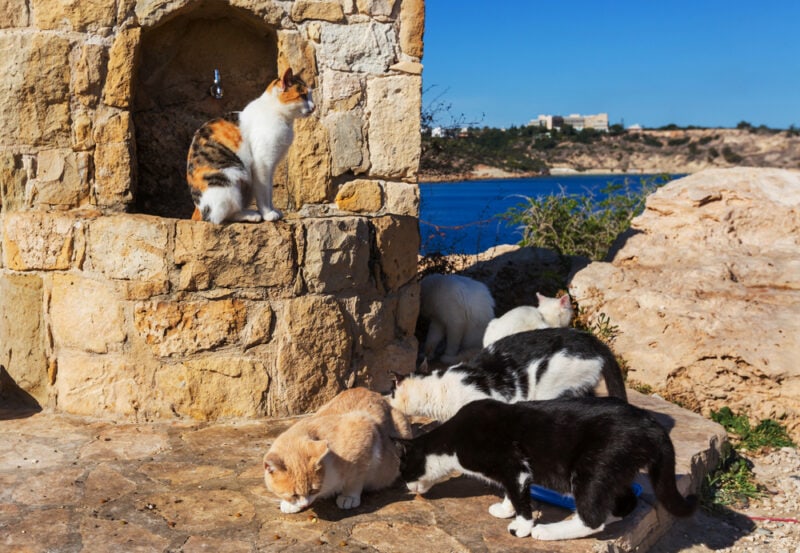VET APPROVED

The information is current and up-to-date in accordance with the latest veterinarian research.
Learn more »Click to Skip Ahead
Maybe you’ve seen it for yourself, or maybe you’ve heard about it from a friend or an acquaintance on the internet, but Greece has a lot of cats! It may seem like no matter where you roam in the country, at least one four-legged traveler is taking the same path as you. As surprising as it may be for some, it isn’t all that uncommon for cats to wander around the streets of Greece. But why? If you are curious to learn more, keep scrolling.

What’s the Deal with Greece’s Cats?

Most of the cats living in Greece are strays. They live in the streets, form colonies, and mark their territories, but most of them are not considered feral cats. They tend to approach people, come into contact with humans regularly, and perhaps even receive food and attention from these people. But they do not officially belong to anyone, so they are strays.
Although they technically do not belong to anyone, they tend to be unofficially adopted by the communities in which they live, making them community cats. The people in Greece often accept the community cats into their area, leaving them food and water. Some even pay for the cat’s medical treatment when needed or to have them spayed or neutered to control the stray cat population.
Some may consider the community cats a nuisance, but many see them as friendly cohabitants. Still, too many unsupervised stray cats can cause problems such as overpopulation, so efforts are being made to manage Greece’s community cats.

Efforts Made to Help Greece’s Community Cats
While most of Greece’s community cats are friendly, there is still a real need to manage the population. Thankfully, several groups are dedicated to monitoring and caring for Greece’s community cat population, such as Animal Action Greece (formerly the Greek Animal Welfare Fund) and Nine Lives Greece.
One significant way that volunteers are helping the community cats of Greece is through TNR programs.
What is TNR?
TNR or TNRM stands for Trap-Neuter-Release-Monitor. This method is a humane and effective approach for managing community cat populations. It consists of trapping unowned cats, neutering or spaying them, and then returning them to the original location. Once the cat is released, they will be monitored by a community member to ensure their continued well-being. Oftentimes, cats are also vaccinated and given flea treatment and deworming, which is called TNVR.
Having the community cats neutered or spayed and vaccinated is the most effective way to manage outdoor cat populations. It also helps to keep them healthy and promote the well-being of neighboring cats that may not have been fixed or vaccinated yet. It has been shown that if 75% of community cats are sterilized and vaccinated, it can significantly stabilize the local cat population. When a cat population is stabilized, there is less noise, spraying, and fighting. This will also provide more space, shelter, and food while reducing their chances of contracting diseases. Moreover, since cats pose a threat to local wildlife species, TNR also provides a solution for this problem.
How to Respond If a Greek Community Cat Approaches You

If you are in Greece, there is a good chance that you will be approached by a community cat sooner or later. While it is always advised to be cautious when introducing yourself to an unfamiliar stray cat for the first time, if the cat approaches you, there is generally no need for worry or concern. Greece’s community cats tend to be very friendly.
They are already well-adjusted to humans and will likely not be wary of you. If you feel up to it, you can take a moment to give the roaming cat some attention.

Conclusion
There are many cats in Greece, and they tend to be incredibly charming. If you plan to travel to Greece, you will likely encounter one of Greece’s many community cats. To learn more about what is being done to help Greece’s community cats, you can check Animal Action Greece and Nine Lives Greece for more information.
If you enjoy seeing these cats on your visit, consider giving back by supporting one of the local charities or organizations working hard to care for these animals. Many of them run essential TNR programs and also provide food, medical care, and shelter to stray and community cats. Even a small donation can make a meaningful difference.
Featured Image Credit: Santorines, Shutterstock











